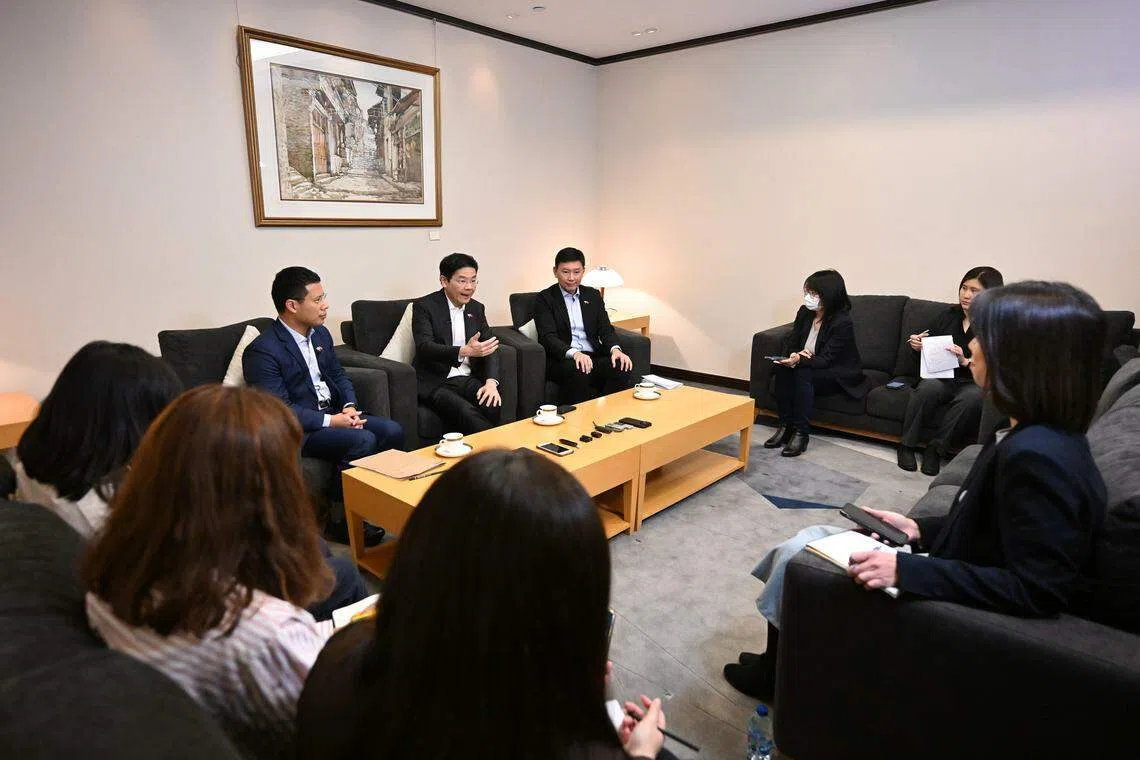Forecasts of China’s slowing growth have no impact on collaboration with Singapore: DPM Wong

Tessa Oh
[BEIJING] Forecasts of China’s slowing growth have not affected Singapore’s collaboration with the country, which remains “an economy with tremendous opportunities for us to work together”, Deputy Prime Minister Lawrence Wong said on Friday (Dec 8).
That is why the upcoming 30-day visa-free travel arrangement between both countries, for instance, will be in Singapore’s interest, he told Singapore media on the final day of his official visit to China.
Expected to be implemented in early 2024, the arrangement will facilitate greater travel between both countries, to the benefit of businesses, academics, students and tourists, added Wong.
At the same media session, Acting Transport Minister Chee Hong Tat noted that Singapore has already received some requests from Chinese carriers to increase the number of flights during the Chinese New Year period in 2024. “We’ll be happy to support this and we will see how we can facilitate the arrangements,” he said.
Asked how economic headwinds have affected the areas in which China is keen to collaborate with Singapore, Wong replied: “They have not impacted collaboration.”
He pointed out that China’s economy is in fact “likely to do relatively well” this year, with full-year growth projected to be above 5 per cent.
But watchers expect China’s growth to slow in the coming years due to structural issues such as weakening productivity growth and an ageing population, as well as ongoing property market woes.
Wong acknowledged that for China’s medium-term prospects, analysts have put forth different forecasts. But he cautioned against writing the country off. “Never bet on the decline of China, because China’s economy is of such tremendous scale (with) so many different areas of strength… and on top of that, they have such a huge market.”
Singapore and China have many mutually beneficial opportunities, Wong added, with a continued “very healthy flow” of Singapore investments into China.
While the Republic’s investments in China’s real estate sector have slowed somewhat, there are opportunities in other areas such as manufacturing, logistics, the green economy and renewable energy, he explained. “These sorts of investments remain very healthy and that speaks to the opportunities that exist between Singapore and China.”

At the same session with Singapore media, Minister for National Development Desmond Lee highlighted Tianjin Eco-City – one of three government-to-government projects between the two countries – as an example of the economic opportunities available in China.
To commemorate the project’s 15th anniversary, a new collaboration framework was announced on Thursday, with 15 new initiatives.
With China having become very advanced in green technologies over the last decade, the project is a chance for Singapore to learn as well, said Lee on Friday.
Both countries can compare notes and exchange ideas – in areas such as green construction, for instance – while creating opportunities for Singaporeans and businesses, he added.
Besides sharing best practices, the Republic can also add value in its partnership with China by being a “reliable and trusted partner” – not just linking bilaterally, but connecting China to the wider region, said Wong.
Asked if both countries are exploring a fourth government-to-government project, Wong replied that nothing is in the works for now, as the bilateral agenda is “very full”.
Elaborating on the mutual visa-free agreement, Chee noted that approvals for flight slots are done twice a year. The next window for approval is around February, for flights happening from Mar 31 till October.
“So between now and February, I think we will be following up with meetings and discussions to see how we can restore as quickly as possible to pre-pandemic levels,” he said. Flights between both countries are now at about 75 per cent of pre-pandemic levels.
Addressing concerns about the likely impact of the visa-free arrangement, Wong stressed that visa-free travel does not mean a lack of immigration checks.
Furthermore, traveller numbers will remain constrained by the number of flights, he added. “That’s why the first thing is really to see how we can get… more direct flights between Singapore and the various Chinese cities.”
Earlier that day, Wong met Chinese Finance Minister Lan Fo’an at the Diaoyutai State Guesthouse in Beijing. It was the first time that both were meeting in their capacities as finance ministers.
During the meeting, Lan shared China’s economic and financial priorities, and both discussed how to step up cooperation bilaterally and at regional platforms, said Singapore’s Prime Minister’s Office in a statement.
Decoding Asia newsletter: your guide to navigating Asia in a new global order. Sign up here to get Decoding Asia newsletter. Delivered to your inbox. Free.
Copyright SPH Media. All rights reserved.



